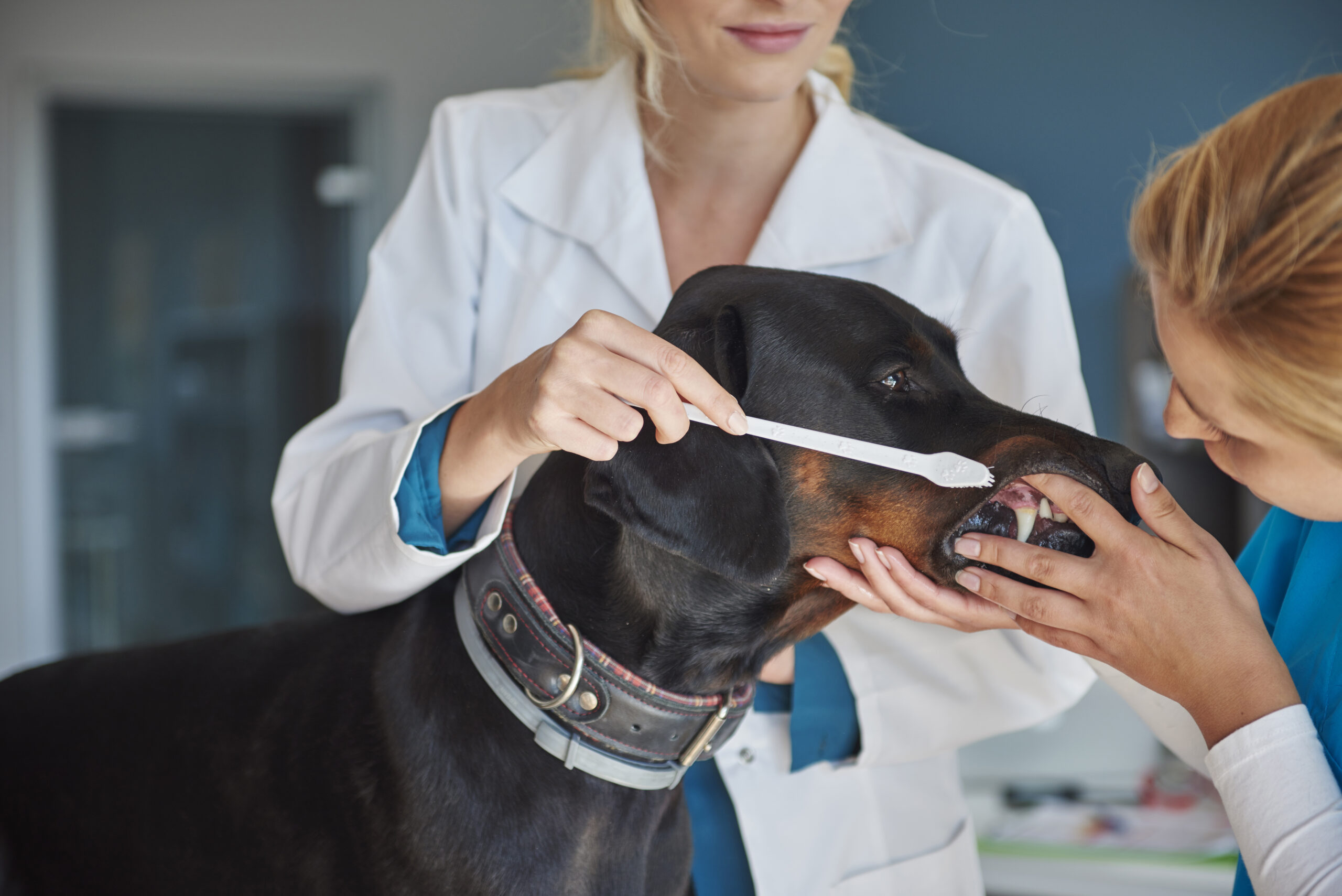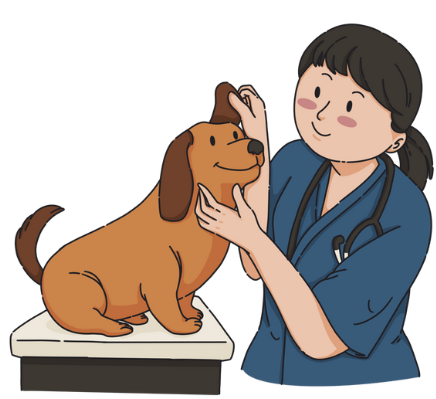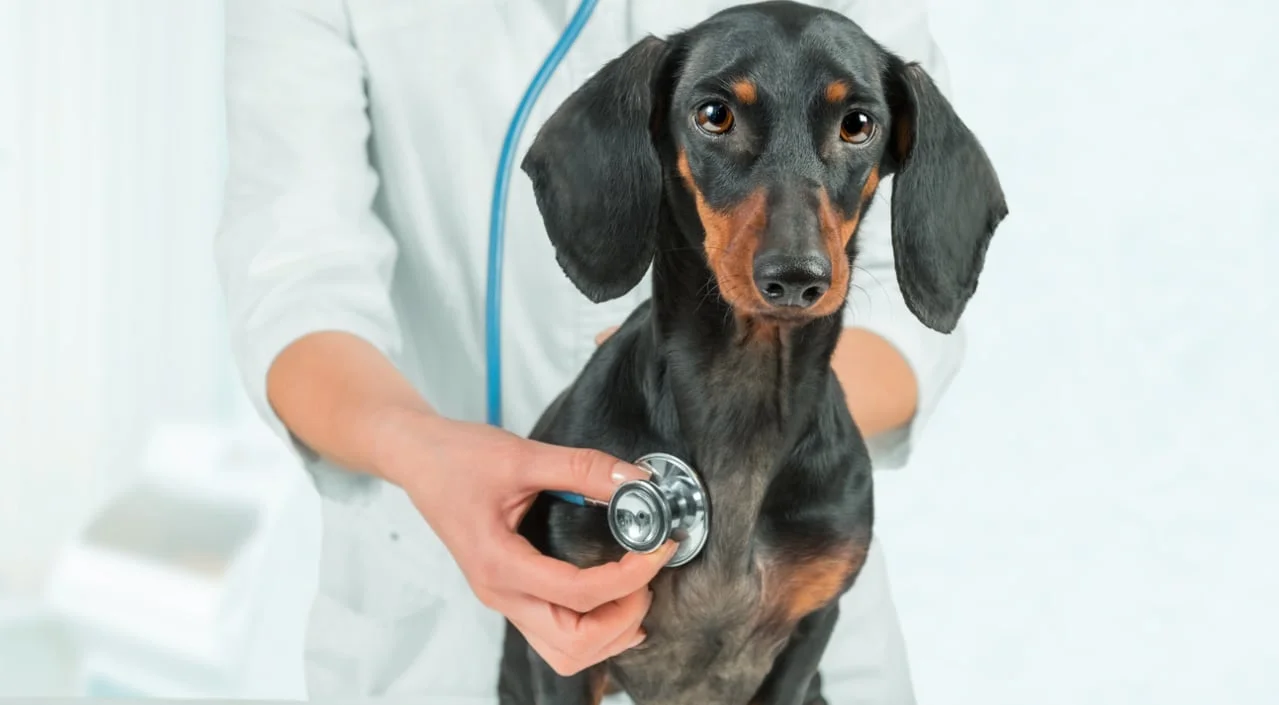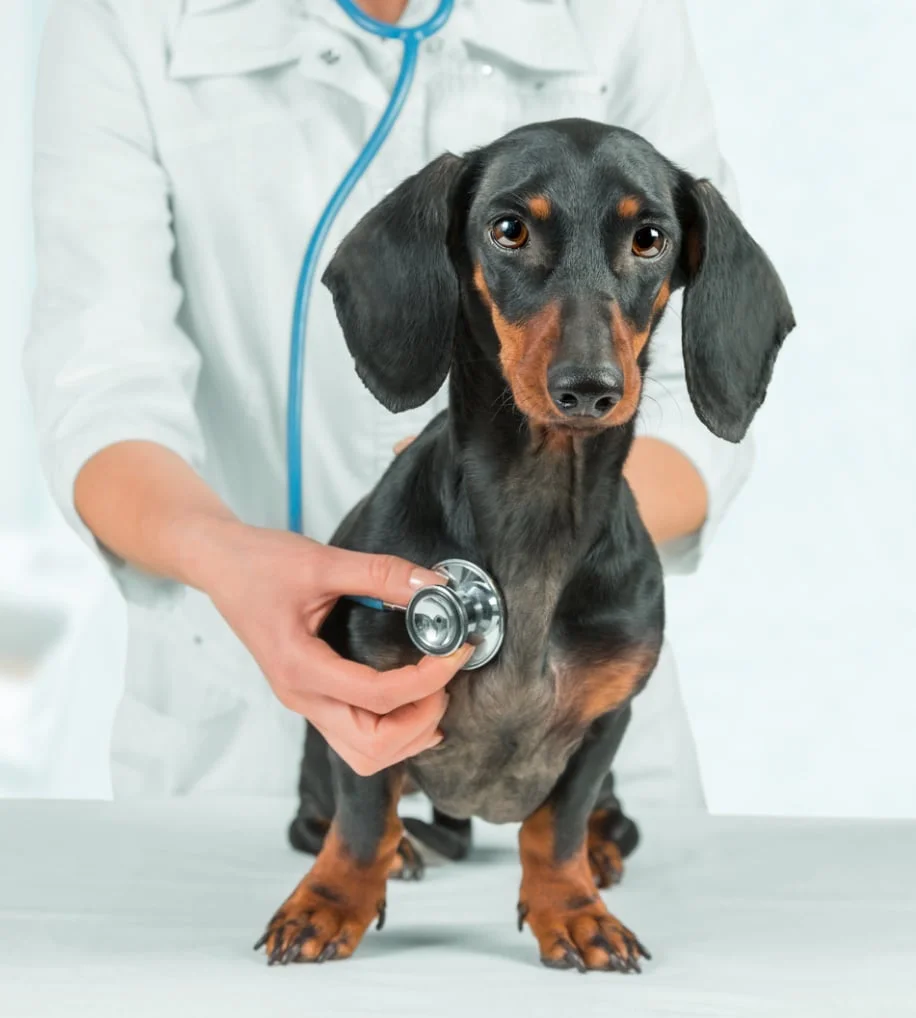Your pet’s dental health isn’t just about maintaining a bright smile – it’s a critical component of their overall well-being. Research shows that up to 80% of dogs and 70% of cats develop some form of dental disease by the age of three, making it one of the most common health issues in pets.
The state of your pet’s teeth and gums can significantly impact their quality of life and longevity. Poor dental hygiene has been linked to serious health complications, including:
Heart disease
Kidney problems
Liver dysfunction
Chronic pain
Reduced appetite
At our San Diego veterinary clinic, we’ve witnessed countless cases where neglected dental care led to preventable health issues. A healthy mouth is the gateway to a healthy pet, and regular dental check-ups are as essential as annual vaccinations. We recommend scheduling a visit for a thorough dental check-up, which you can easily do by booking an appointment with us.
Understanding the Risks of Ignoring Dental Health
Periodontal disease progresses through four distinct stages, each presenting escalating risks to your pet’s health:
Stage 1 – Gingivitis: Red, swollen gums with mild inflammation
Stage 2 – Early Periodontitis: 25% attachment loss, visible plaque
Stage 3 – Moderate Periodontitis: 50% attachment loss, bone deterioration
Stage 4 – Advanced Periodontitis: Severe bone loss, loose teeth, chronic pain
Research shows that 80% of pets develop periodontal disease by age three, making it the most common clinical condition in cats and dogs. This startling statistic highlights the critical need for early intervention and proper oral hygiene practices.
The impact of untreated dental disease extends far beyond the mouth. Bacteria from plaque buildup can enter your pet’s bloodstream, potentially causing:
Kidney damage: Bacterial infections can compromise kidney function
Liver complications: Toxins from oral bacteria strain liver health
Heart problems: Bacteria can attach to heart valves, causing infection
These systemic effects make dental health a crucial component of your pet’s wellbeing. At Spring Valley Veterinary Hospital, we regularly witness cases where delayed dental care leads to serious organ complications – issues that could have been prevented through routine dental maintenance.
Increased Infection Risk and Its Impact on Overall Health
Dental disease creates a direct pathway for harmful bacteria to enter your pet’s bloodstream. These bacteria trigger an immune response, forcing your pet’s body to divert resources from other essential functions to fight the infection.
Research shows that 80% of pets with dental disease develop compromised immune systems within two years of onset. Your pet becomes more susceptible to:
Respiratory infections
Skin conditions
Urinary tract infections
Digestive issues
The connection between dental health and heart disease is particularly alarming. Studies reveal that pets with untreated dental infections are 5 times more likely to develop heart conditions. Bacteria from infected gums can:
Attach to heart valves
Create inflammatory responses
Cause irregular heart rhythms
Lead to heart muscle damage
Early detection through regular veterinary check-ups helps identify potential issues before they escalate. At Spring Valley Veterinary Hospital, our comprehensive dental examinations include:
Digital X-rays to spot hidden infections
Bacterial culture tests
Gum tissue assessment
Blood work to check for systemic effects
Your pet’s immune system serves as their primary defence against illness. Dental infections force this system to work overtime, leaving your pet vulnerable to various health complications.
Complications with Diabetes Management Due to Poor Dental Hygiene
Diabetic pets face unique challenges when dealing with dental health issues. Poor oral hygiene creates a dangerous cycle that directly impacts blood sugar control:
Bacterial Infections: Untreated dental problems release harmful bacteria into the bloodstream, making it harder for diabetic pets to maintain stable glucose levels
Insulin Resistance: Chronic gum inflammation triggers the release of stress hormones, reducing the effectiveness of insulin treatments
Compromised Healing: High blood sugar levels impair the body’s natural healing abilities, making dental infections more severe and persistent
Research shows diabetic pets with periodontal disease require up to 40% higher insulin doses compared to those with healthy teeth. The presence of oral infections can mask or alter blood glucose readings, leading to incorrect insulin dosing.
Signs your diabetic pet might be struggling with dental issues:
Sudden changes in blood sugar readings despite consistent insulin doses
Increased thirst and urination
Reluctance to eat hard food
Red, swollen gums
Bad breath that doesn’t improve with regular cleaning
Regular dental check-ups become essential for diabetic pets, as professional cleaning helps break the inflammatory cycle. Your veterinarian might recommend more frequent dental examinations to prevent complications and maintain stable blood sugar levels.
The Impact of Neglected Dental Health on Quality of Life
Pets can’t verbally communicate their dental pain, making it challenging for owners to recognise when their beloved companions are suffering. Your pet’s natural instinct is to mask signs of discomfort – a survival mechanism inherited from their wild ancestors.
Key Signs of Dental Pain in Pets:
Dropping food whilst eating
Chewing on one side of the mouth
Pawing at the face or mouth
Excessive drooling or bloody saliva
Bad breath (halitosis)
Reduced grooming habits
Changes in behaviour or irritability
Loss of interest in toys or play
Dental pain significantly impacts your pet’s daily activities. A cat or dog experiencing oral discomfort might withdraw from social interactions, display changes in sleeping patterns, or exhibit decreased appetite. These behavioural shifts can lead to weight loss, muscle wastage, and diminished energy levels.
At Spring Valley Veterinary Hospital, we’ve observed that pets with untreated dental issues often display subtle changes in their eating habits. They might switch from hard to soft foods, eat more slowly than usual, or show reluctance to eat their regular meals.
The impact extends beyond physical symptoms – dental pain creates chronic stress in pets, affecting their emotional well-being and ability to enjoy life. Regular dental check-ups help identify these issues before they severely impact your pet’s quality of life.
Physical Damage from Neglect: Beyond Just Bad Breath and Dirty Teeth
Neglecting your pet’s dental health can lead to severe physical damage that extends far beyond cosmetic issues. The structural integrity of your pet’s mouth depends on healthy teeth and supporting bone structure.
Common Physical Injuries Include:
Fractured teeth from weakened enamel
Broken jaw bones due to severe infection
Tooth root abscesses causing facial swelling
Oronasal fistulas (holes between mouth and nasal cavity)
Bone loss in the jaw
Chronic tissue damage from exposed nerve endings
These injuries aren’t merely painful – they can permanently alter your pet’s facial structure. At Spring Valley Veterinary Hospital, we’ve treated cases where pets required extensive reconstructive surgery due to dental neglect.
The bone supporting your pet’s teeth becomes compromised when bacteria from plaque penetrates deep into the tissue. This deterioration can create weak points in the jaw, making it susceptible to fractures during normal activities like eating or playing.
Warning Signs of Structural Damage:
Facial asymmetry or swelling
Reluctance to pick up toys
Blood spots on chew toys
Pawing at the face
Visible gaps or spaces between teeth
Misaligned bite pattern
Dental x-rays often reveal hidden structural damage beneath the gum line, where 60% of the tooth structure lies. This damage can progress silently until a catastrophic injury occurs.
The Silent Threats: Undetectable Issues That Can Cause Severe Problems Later On
Pets have an incredible ability to hide their pain – an evolutionary trait that can be dangerous when it comes to dental health. Your pet may continue eating, playing, and behaving normally even if they have serious dental problems.
Common Hidden Dental Problems:
Tooth root abscesses
Cracked teeth beneath the gum line
Deep periodontal pockets
Early-stage oral tumours
Hidden infections
These silent conditions often worsen without any visible symptoms until they become advanced. At Spring Valley Veterinary Hospital, we’ve treated many cases where pets showed no outward signs of distress until their dental issues became severe.
Regular veterinary check-ups are essential for finding these hidden problems. Our veterinarians use special tools and techniques to identify issues that aren’t visible to the naked eye:
Digital dental X-rays show problems below the gum line
Periodontal probing measures hidden pockets of infection
Professional examination spots early signs of disease
Comprehensive oral health assessments track changes over time
A seemingly healthy mouth can hide serious dental problems. At our San Diego facility, we’ve seen cases where pets continued eating normally despite having significant dental disease – a testament to their amazing ability to tolerate pain.
Your pet’s dental health needs proactive care through regular professional examinations. These check-ups help find and fix potential issues before they turn into painful, costly problems.
Preventive Measures You Can Take To Ensure Your Pet Has Healthy Teeth And Gums Throughout Their Life
Taking proactive steps to maintain your pet’s dental health can prevent serious complications and costly treatments. Here’s your comprehensive guide to keeping those pearly whites healthy:
Regular Veterinary Check-ups
Your pet needs professional dental examinations at least twice a year. At Spring Valley Veterinary Hospital, our veterinarians perform:
Thorough oral cavity inspections
Digital dental X-rays to detect hidden issues
Professional cleaning under anaesthesia when needed
Assessment of gum health and tooth stability
Daily Dental Care Practices
Creating a consistent dental care routine at home is essential:
1. Brushing Technique
Use pet-specific toothbrushes and toothpaste
Brush in circular motions at a 45-degree angle
Focus on the gum line where plaque builds up
Start with 30 seconds and gradually increase duration
2. Timing and Frequency
Brush your pet’s teeth daily, ideally after their last meal
Choose a quiet time when your pet is relaxed
Make it a positive experience with rewards and praise
Dental Products and Tools
Recommended dental aids:
Finger brushes for sensitive pets
Water additives to fight bacteria
Dental wipes for quick cleaning
Oral rinses prescribed by your vet
The Power of Dental Chews and Toys
Strategic use of dental products can enhance your pet’s oral hygiene:
Effective chew toys:
Rope toys for natural flossing action
Rubber toys with cleaning nubs
Dental chews with enzymatic properties
Size-appropriate bones (under veterinary guidance)
Smart selection tips:
Choose products with the Veterinary Oral Health Council (VOHC) seal
Match toy size to your pet’s jaw strength
Replace worn items regularly
Monitor your pet during chewing sessions
At Spring Valley Veterinary Hospital, we can help you create a tailored dental care plan that suits your pet’s specific needs. Our team provides demonstrations of proper brushing techniques and recommends appropriate dental products for your pet’s age, size, and health status.
Professional Veterinary Services For Comprehensive Dental Care
Professional veterinary dental care goes beyond basic cleaning – it’s a comprehensive medical procedure performed under strict protocols. At Spring Valley Veterinary Hospital, our dental services include:
Pre-Procedure Assessment
Complete blood work evaluation
Physical examination
Detailed medical history review
X-rays to detect hidden dental issues
Professional Cleaning Procedure
Safe anaesthesia administration
Advanced scaling equipment for tartar removal
Root planing beneath the gum line
Professional polishing of tooth surfaces
Application of protective sealants
Species-Specific Care
For Dogs:
Specialised equipment for different breed sizes
Targeted treatment for common canine issues
Assessment of bite alignment
Treatment of fractured teeth
For Cats:
Gentle handling techniques
Treatment of feline-specific conditions
Resorptive lesion management
Stomatitis treatment options
Emergency Dental Services
Our team is also equipped to handle emergency dental situations, providing 24/7 care for acute dental trauma, treatment of broken or fractured teeth, management of severe infections, immediate pain relief protocols, and surgical extractions when needed.
Our veterinary team uses state-of-the-art digital radiography and modern dental equipment to ensure the highest standard of care. Each procedure is tailored to your pet’s specific needs, with careful monitoring throughout the anaesthesia process.
The hospital maintains strict sterilisation protocols and uses veterinary-grade dental instruments. Our dental suite is equipped with advanced monitoring systems to track your pet’s vital signs during procedures.
We provide detailed post-procedure care instructions and schedule follow-up appointments to monitor healing progress. Your pet’s comfort and safety remain our primary focus throughout their dental treatment journey.
Additionally, we offer a wide range of veterinary clinic services including expert vaccinations to protect your pets’ health.
Conclusion: Prioritising Your Pet’s Dental Health Is Key To Their Overall Well-Being
Your pet’s dental health directly impacts their quality of life and longevity. A proactive approach to dental care can prevent serious health complications and save your pet from unnecessary pain and discomfort.
Take action today:
Schedule regular dental check-ups at Spring Valley Veterinary Hospital
Implement daily tooth brushing routines
Choose appropriate dental toys and treats
Watch for signs of dental distress
Your pet relies on you to make smart healthcare decisions. By prioritising their dental health now, you’re investing in their future well-being. Don’t wait for dental issues to become emergencies – book a dental examination at our San Diego clinic on (619) 475-3000 and give your pet the gift of a healthy smile. If you’re considering a career in veterinary medicine, we also have career opportunities available. Plus, don’t forget to check out our special offers such as 10% off your first booking.
Frequently Asked Questions
Dental health is crucial for pets as it directly impacts their overall well-being. Poor dental hygiene can lead to periodontal disease, which affects not only the mouth but also may cause long-term damage to vital organs such as the kidneys, liver, and heart. Regular dental care helps prevent these serious health issues.
Pets often have difficulty expressing pain, but common signs of dental pain include decreased appetite, excessive drooling, and behavioral changes such as irritability or withdrawal. It's essential to monitor your pet for these symptoms and consult a veterinarian if you notice any concerning changes.
Poor dental hygiene can significantly complicate diabetes management in pets. Inflammation and infections caused by dental disease can exacerbate diabetes complications, making it more challenging to regulate blood sugar levels. Maintaining good oral hygiene is vital for diabetic pets.
To ensure your pet has healthy teeth and gums throughout their life, it's important to schedule regular veterinary check-ups, practice daily dental care at home (such as brushing their teeth), and provide dental chews or toys designed to maintain oral hygiene.
Professional veterinary services for pet dental care include routine canine and feline dental cleaning procedures, emergency dental care services, and specialized treatments tailored to address various dental issues. Regular visits to a veterinary clinic are essential for comprehensive oral health management.
Neglecting your pet's dental health can lead to severe consequences such as periodontal disease, increased risk of infections that weaken the immune system, complications with existing health conditions like diabetes, physical injuries (e.g., broken jaws), and a significant decline in quality of life due to persistent pain.
 Get $20 Off
Get $20 Off








